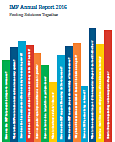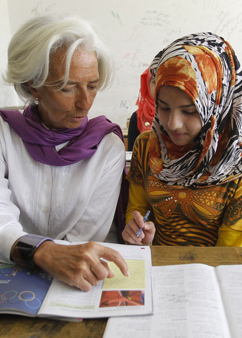Year of Development
With 2015 designated the Year of Development, the international community focused on building a global partnership to enable low-income developing countries to lay the foundations for inclusive and sustainable growth in the coming decades. At the core of the effort are the Sustainable Development Goals (SDGs)—a set of targets adopted by the United Nations in September 2015 that span a range of economic, social, and environmental goals. The SDGs replace the Millennium Development Goals, a set of targets for the period 2000–15 that centered on halving global poverty and improving development indicators related to health and education. The challenge for donor countries and international financial institutions is to make the accomplishment of these goals a reality.
The IMF stepped up with a package of commitments that were presented at the Third International Conference on Financing for Development, held in Addis Ababa, Ethiopia, in July 2015. The measures were set out in two policy papers discussed by the Executive Board on July 1 and July 6. The Board approved a comprehensive approach that includes enhanced financial support and intensified policy advice, technical assistance, and capacity development. The Fund’s commitments were outlined in the speech by Managing Director Christine Lagarde to the Brookings Institution.
The Fund’s commitments to the international community go beyond financing, reflecting the fact that the SDGs address a broad range of issues at the core of the IMF’s mandate. These include domestic revenue mobilization, expenditure efficiency and effectiveness, attracting and managing capital flows, expanding public investment, and international policy issues such as maintaining global financial stability and international tax cooperation. Many of these issues were discussed in September 2015 when UN members gathered in New York City to launch the SDGs and were highlighted in an IMF Staff Discussion Note issued for that gathering. The IMF already devotes one-fifth of its capacity development spending to providing tax policy and tax administration assistance, and further resources will be allocated under the new measures (see box on IMF commitments).
Climate change is inextricably linked to sustainable development because the world’s poorest people are most affected by the issues raised by humans’ accelerating impact on the environment. A third international gathering on these issues took place in Paris in December 2015, producing a landmark agreement that provides a framework for meaningful progress on climate change mitigation. A Staff Discussion Note produced at that time outlined the fiscal, macroeconomic, and financial implications of climate change.
The IMF also plans to help countries address large infrastructure gaps more efficiently and sustainably by providing advice and technical assistance in key areas of public investment management needed for effective infrastructure spending. The IMF will deepen its analysis of the relationships between public investment, growth, and debt sustainability to help identify the appropriate pace for scaling up infrastructure spending.
The first steps toward inclusive and sustainable development were taken in 2015. The challenge is to continue that work into the future.
Myanmar: Reforming Taxes for Inclusive Growth
After 50 years of relative isolation, Myanmar faced the challenge of modernizing its tax system to match the demands of a more open and dynamic economic environment and to mobilize revenue to fund overdue structural and social reforms. The country’s tax-to-GDP ratio stood at below 7 percent in 2012, one of the lowest in the world, and the authorities sought to boost tax revenues in a fair, equitable, and transparent manner.
The IMF helped design a reform strategy with the support of a multipartner trust fund, the Tax Policy and Administration Topical Trust Fund. The main goal of the reform is to strengthen the institutional capacity of Myanmar’s tax administration and prepare both the administration and the business community for longer-term tax reforms. Outcomes include a broadened tax base and improved compliance.
Results
From a very low base, Myanmar has made progress:
- Since 2012, revenues from major taxes have increased on average more than 20 percent annually.
- Compliance by large taxpayers in the areas of registration, on-time filing, and payment is nearing international good practice.
- Tax policy reforms focusing on broadening the base of indirect taxes have begun, and the tax department is better positioned to begin a review of the direct-taxes base.
An important task of the reform effort is to build stronger public understanding of the role of taxation in financing essential public goods and services and also to ensure an understanding that paying taxes is a hallmark of an effective modern nation. Myanmar will need wide-ranging support in its pursuit of inclusive growth for many years, but early results look promising.
Small States’ Resilience to Natural Disasters and Climate Change
At a time of climate change, small island states in the Pacific Ocean and the Caribbean Sea are among the countries most susceptible to natural disasters, including cyclones, tsunamis, and floods. Climate change itself poses risks to the continued survival of some Pacific islands.
The IMF’s ongoing work with small states encompasses a range of macroeconomic and related policy issues, and as the incidence of natural disasters affecting small states has increased in recent years, the focus of the work has shifted toward policies aimed at strengthening the policy response to natural disasters and climate change.
While analytical work had previously been conducted on a country-by-country basis, in June 2015 staff published the first cross-country study quantifying the impact of natural disasters: an IMF Working Paper titled “Enhancing Macroeconomic Resilience to Natural Disasters and Climate Change in the Small States of the Pacific.”
The paper concluded that assessing the prospective fiscal costs and growth impact of natural disasters is key to evaluating the Pacific island countries’ long-term prospects. Building estimates into the macroeconomic framework before an event occurs can help enhance countries’ disaster risk management and thus the ability to cope with such events, the paper said.
Integrating such prospective costs into each country’s debt sustainability analysis could help determine the magnitude of the need for fiscal and financial buffers and other sources of financing. Such a process also can determine the fiscal space available for building infrastructure to address natural disasters and climate change. These steps would enable IMF policy advice to be better tailored to each country’s needs.
The study will be followed in FY2017 by a policy paper on the same theme, assessing how the Fund can best support growth and boost resiliency in small states in the Caribbean and Pacific regions.
In May 2015, the staff report “Macroeconomic Developments and Selected Issues in Small Developing States” was publicly released. The paper developed the analysis from several previous papers on small states and was discussed by the Executive Board in an informal session during fiscal year 2015.











